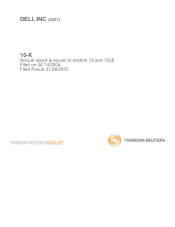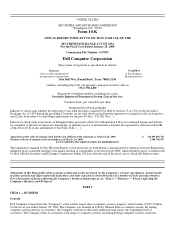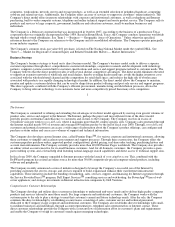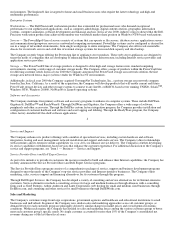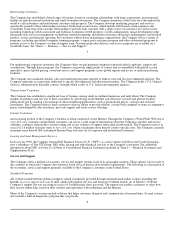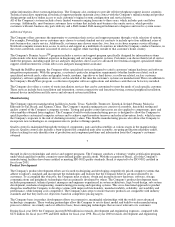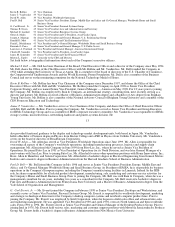Dell 1999 Annual Report Download - page 7
Download and view the complete annual report
Please find page 7 of the 1999 Dell annual report below. You can navigate through the pages in the report by either clicking on the pages listed below, or by using the keyword search tool below to find specific information within the annual report.
online information about system malfunctions. The Company also continues to provide toll free telephone support in most countries.
Technical specialists supporting all technical support programs maintain close contact with the Company's manufacturing and product
design groups and have online access to each customer's original system configuration and service history.
All of the Company's systems include a basic limited warranty ranging from one to three years, which includes parts and labor
coverage. Additionally, most business customers have systems that include next-business-day onsite service, which provides
customers with next-business-day parts delivery and a Dell-trained, Dell-managed technician to diagnose and resolve system issues.
Additional Options
The Company offers customers the opportunity to customize their service and support programs through a wide selection of options.
For example, PowerEdge server customers may choose to extend standard service contracts to include up to four additional years of
next-business-day, onsite service. Additionally, customers may choose same day, two, four or six-hour response service offerings.
Notebook computer owners have access to service and support in a multitude of countries in which the Company conducts business, in
the event a notebook customer is in need of service or support while traveling outside of that customer's home country.
The Company's Premier AccessTM program includes a service and support program specifically designed for information systems
professionals who have technical expertise in diagnosing and servicing computer systems. Customers can choose their level of service
under the program, including rapid service and parts dispatches, direct access to advanced level technical support, specialized online
support, reimbursement for certain labor costs and parts management assistance.
Through the DellPlus program, the Company offers specialized services designed to satisfy customers' unique hardware and software
integration requirements. With this program, a customer's particular integration requirements (whether hardware related, such as
specialized network cards, video and graphic boards, modems, tape drives or hard drives; or software related, such as customer
proprietary software applications or drivers) can be satisfied at the time the customer's systems are manufactured. This is in addition to
the Company's ReadyWare program, a collection of popular software applications and interface cards that can be factory-installed.
The Company also offers a variety of onsite installation services that can be customized to meet the needs of each specific customer.
These services include basic installation and orientation, system connectivity and functional testing, external peripheral installation,
internal device installation and file server and advanced system installation.
Manufacturing
The Company operates manufacturing facilities in Austin, Texas; Nashville, Tennessee; Limerick, Ireland; Penang, Malaysia;
Eldorado do Sul, Brazil; and Xiamen, China. The Company's manufacturing process consists of assembly, functional testing and
quality control of the Company's computer systems. Testing and quality control processes are also applied to components, parts and
subassemblies obtained from suppliers. The Company's build-to-order manufacturing process is designed to allow the Company to
quickly produce customized computer systems and to achieve rapid inventory turnover and reduced inventory levels, which lessens
the Company's exposure to the risk of declining inventory values. This flexible manufacturing process also allows the Company to
incorporate new technologies or components into its product offerings quickly.
Quality control is maintained through the testing of components, parts and subassemblies at various stages in the manufacturing
process. Quality control also includes a burn-in period for completed units after assembly, on-going production reliability audits,
failure tracking for early identification of production and component problems and information from the Company's customers
obtained
7
through its direct relationships and service and support programs. The Company conducts a voluntary vendor certification program,
under which qualified vendors commit to meet defined quality specifications. With the exception of Brazil, all of the Company's
manufacturing facilities have been certified as meeting ISO 9002 quality standards. Brazil is expected to be ISO 9002 certified in
fiscal year 2001.
Product Development
The Company's product development efforts are focused on designing and developing competitively priced computer systems that
adhere to industry standards and incorporate the technologies and features that the Company believes are most desired by its
customers. To accomplish this objective, the Company must evaluate, obtain and incorporate new hardware, software, storage,
communications and peripherals technologies that are primarily developed by others. The Company's product development team
includes programmers, technical project managers and engineers experienced in system architecture, logic board design, sub-system
development, mechanical engineering, manufacturing processing and operating systems. This cross-functional approach to product
design has enabled the Company to develop systems with improved functionality, manufacturability, reliability, serviceability and
performance, while keeping costs competitive. The Company takes steps to ensure that new products are compatible with industry
standards and that they meet cost objectives based on competitive pricing targets.
The Company bases its product development efforts on cooperative, meaningful relationships with the world's most advanced
technology companies. These working partnerships allow the Company to use its direct model and build-to-order manufacturing
process to deliver, on a timely and cost-effective basis, those emerging technologies that are most relevant to its customers.
During fiscal year 2000, the Company incurred $568 million in research, development and engineering expenses, compared with
$272 million for fiscal year 1999 and $204 million for fiscal year 1998. Fiscal year 2000 research, development and engineering

